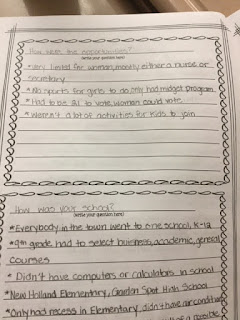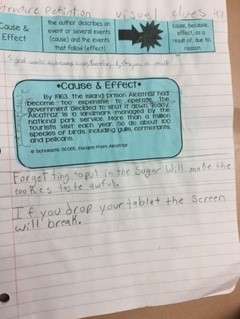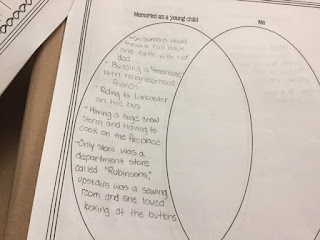Your students *sort of* know the different text structures, right? They might even be able to remember 1 or 2 of them.
But do they really get how to compare and contrast? My students could contrast til the cows came home, but they struggled to compare.
So I created a personal family history project to help them master those two concepts.
Day 1 - Learning Text Structures
On the first day, I had students use their interactive notebooks to get a grasp on each of the five types of text structures: cause and effect, compare and contrast, descriptive, sequence of events, and problem and solution. I used a review I had found on TeachersPayTeachers.Day 2 - Reading Text Structures
On the second day, we took a look at short passages about Alcatraz Prison off the coast of San Francisco. The text structure for each passage was given, so I had the students work with a partner to find and underline the keywords that identified each kind of structure. We discussed those as a class to make sure we got them all.
Day 3 - From Reading to Writing
The next day, we picked a topic -- chocolate chip cookie dough -- and I modeled how to write some sentences for each text structure. Then they picked their own topics, and wrote sentences for them in their notebooks. (Sorry that the picture of my Activboard is so lousy!)Compare and Contrast at the next level
For students to really grasp these concepts, it seemed important to have them write in those styles. So I created an Ancestry Heritage Project for Comparing and Contrasting.
They were to interview someone - hopefully a grandparent or great-grandparent - but someone from a generation older than theirs. We developed some questions they would all ask and they could also add some questions of their own.
Explicit Instruction is needed
It is easy, with an assignment like this, for students to write about their "Person A" and then write about themselves. What you get is two contrasting passages, two silos of information, with no real way to compare them, other than perhaps, "we're related."
So, we looked at comparing events instead: "How did your grandfather meet his best friend?" and "How did you meet yours? were compared and contrasted.
So, we looked at comparing events instead: "How did your grandfather meet his best friend?" and "How did you meet yours? were compared and contrasted.
"I didn't know that!"
It warmed my heart to hear students talk about how well they thought they knew the person they were interviewing, but this project opened their eyes to new experiences. It was especially heart-warming to hear them find commonalities between themselves, and especially, their grandparents.
 I'm so glad we did this project! Students became so much more familiar with comparing and contrasting information as a text structure, and they learned new and interesting things about their relatives!
I'm so glad we did this project! Students became so much more familiar with comparing and contrasting information as a text structure, and they learned new and interesting things about their relatives!





No comments
Post a Comment